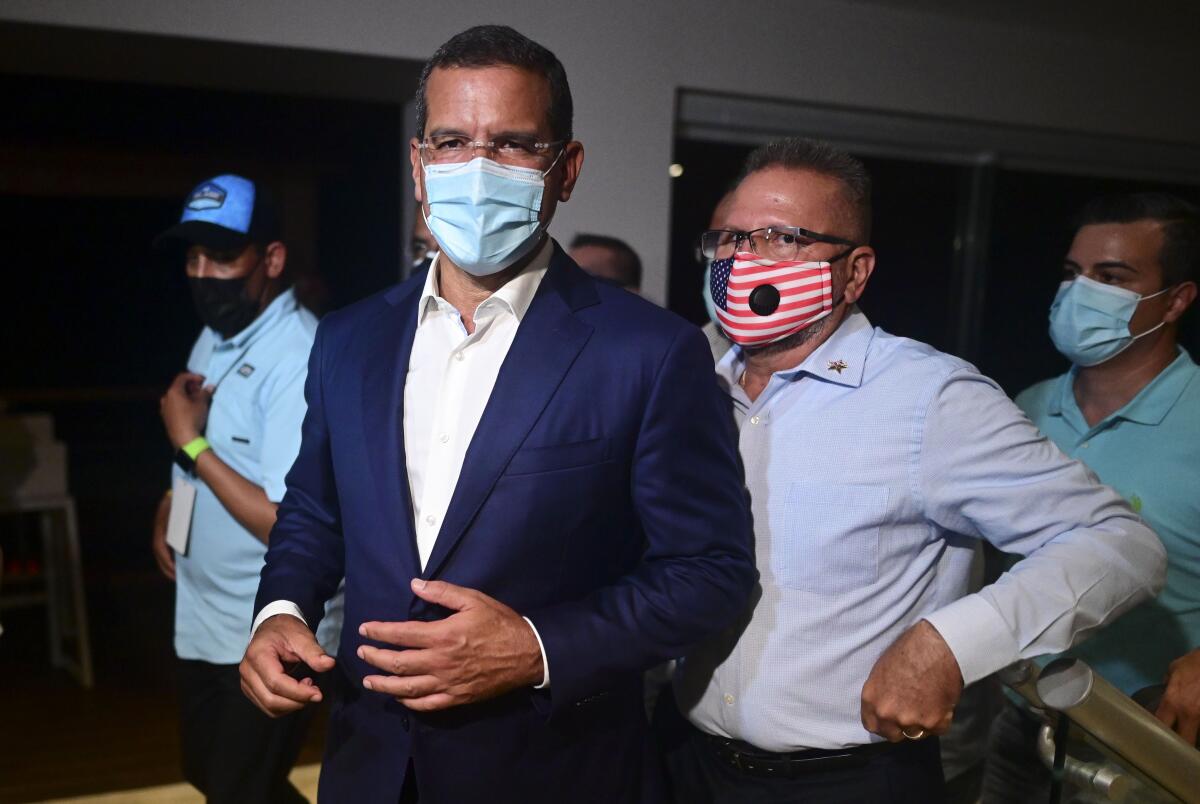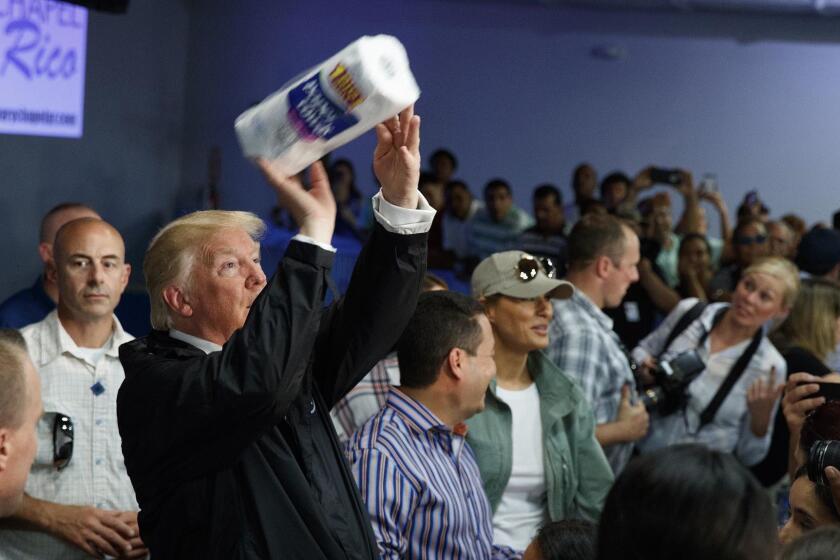New governor sworn in as a wary Puerto Rico demands changes

- Share via
SAN JUAN, Puerto Rico — Pedro Pierluisi vowed to achieve statehood for Puerto Rico and fight against poverty, corruption and COVID-19 after he was sworn in Saturday as the U.S. territory’s new governor.
Pierluisi, a Democrat who previously served as Puerto Rico’s representative in Congress for eight years, also promised to prioritize education, lift the government out of bankruptcy and alleviate a deep economic crisis as leader of the pro-statehood New Progressive Party.
“I have listened to our people and acknowledged the needs for better governance,” he said in a bilingual speech with a strong conciliatory tone. “I need everyone to battle our common enemies.”
Saturday’s ceremony marked the end of a chaotic four-year period in which Puerto Rico had three governors, including Pierluisi himself briefly after former Gov. Ricardo Rosselló stepped down last year following huge street protests.
President Trump on Wednesday staged a briefing on federal preparedness for the hurricane season now underway, repeatedly lauding his administration’s “incredible job” last year while remaining silent on Puerto Rico’s lingering problems and new estimates of its massive death toll.
Pierluisi, 61, inherits a stagnant economy, a divided legislature, a billion-dollar public debt restructuring and a politically fractured U.S. territory hit hard by the pandemic as it still struggles to recover from hurricanes and earthquakes.
“Some very difficult years await him and the island,” said political analyst Mario Negrón. “The economy is in critical condition, and even though federal funds are on their way, people forget that the debt will have to be paid starting in February.”
Pierluisi, who is known for his conciliatory nature, will be leading a disgruntled and exhausted population after obtaining the lowest number of votes of any governor in Puerto Rico’s history. He received nearly 33% of votes compared with nearly 32% obtained by Carlos Delgado of the Popular Democratic Party, marking the first time either party failed to reach 40% of votes.
New and longtime minority political parties gained ground during November’s election, with no clear majority emerging in the island’s legislature, meaning Pierluisi will have to seek consensus with members of four other parties, Negrón said.
“I’d like to think that people will grow during this moment of political crisis,” he said. “Experience has taught me all the contrary.”
During November’s election, voters also participated in a nonbinding referendum that asked, “Should Puerto Rico be admitted immediately into the union as a state?” More than 52% of voters approved, but any changes to the island’s political status need approval from the U.S. Congress. It is the island’s sixth such referendum.
President-elect Joe Biden has promised to work with local government officials who support a variety of political outcomes for Puerto Rico to “initiate a just and binding process” for the island to determine its own status.
Despite Pierluisi’s search for statehood, political analyst Eduardo Villanueva said the new governor and his party face a fundamental problem: They haven’t said what kind of contributions, including economic ones, Puerto Rico would make if it becomes a state.
Villanueva also noted that Pierluisi’s agenda could be limited by the powers of a federal control board that oversees the island’s finances: “One doesn’t have the last word and cannot establish priorities.”
Congress created the board in 2016, a year after Puerto Rico declared its more than $70-billion public debt unpayable, an amount accumulated in part by previous administrations borrowing money to cover budget deficits.
Pierluisi takes over from Gov. Wanda Vázquez, whom the island’s Supreme Court ordered be appointed governor in August 2019 after Rosselló resigned. At the time she was the island’s justice secretary, but since there was no secretary of state at the time, Puerto Rico’s constitution dictated she assume the governorship. Vázquez later lost against Pierluisi during a chaotic primary in early August that had to be held a second time because ballots did not make it to voting centers on time.
Saturday’s outdoors event was fiercely criticized by many Puerto Ricans angry that Pierluisi invited some 400 guests despite the pandemic and amid measures that prohibit people from gathering in large groups or going to the beach unless they’re exercising.
Pierluisi defended his actions, noting that face masks were mandatory and that everyone attending had to submit a negative COVID-19 test. Independent health experts, however, warned the event still posed a risk.
The island of 3.2 million people has reported more than 127,000 confirmed and probable COVID-19 cases and more than 1,500 deaths.
A new legislature also was sworn in on Saturday, marking the first time that the majority of Puerto Rico’s Senate is female.
More to Read
Sign up for Essential California
The most important California stories and recommendations in your inbox every morning.
You may occasionally receive promotional content from the Los Angeles Times.














